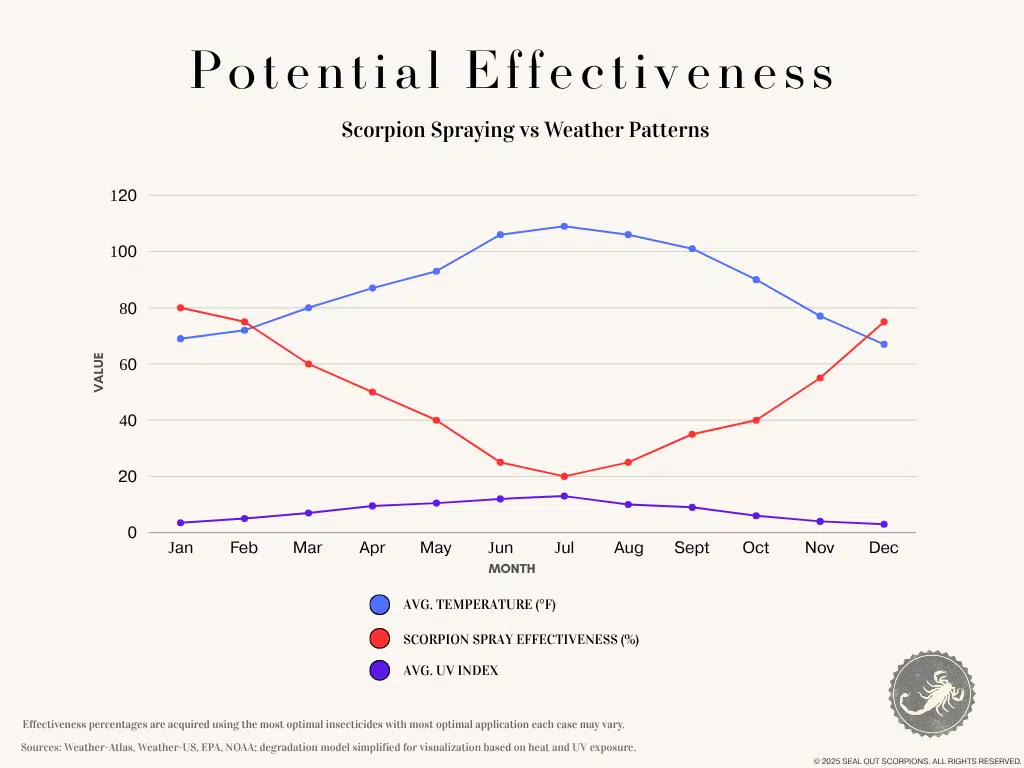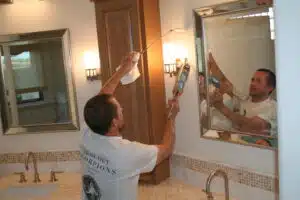Why Scorpions Keep Coming Back, Even After You Spray
It’s Not Your Fault & It’s Not Just Your Home
You’ve either lived here or heard the horror stories: Arizona scorpions turning up in shoes, sinks, showers, even crawling across the ceiling above your bed. Once mainly a seasonal headache, scorpions have now become a concern nearly year-round across many neighborhoods in the Phoenix Metro and broader Sonoran Desert.

But after some time, maybe weeks, maybe months, you may keep experiencing the same frustrating cycle. Another scorpion. Another uneasy night. Another phone call for another round of spraying.
Here’s the hard truth most companies won’t tell you: it’s not because your home is uniquely “bad” or because you didn’t spray enough. It’s because general pest control simply doesn’t address the way scorpions operate, biologically, behaviorally, or environmentally.
And until you approach the problem with that level of precision, you’ll likely keep finding yourself in this costly, unsettling loop.
The Big Myth: You’re Not Dealing With a Colony
Ants Have Colonies. Termites Have Colonies. Scorpions? They’re Solitary Hunters
There is no nest to eradicate, no queen to eliminate to collapse a population. Bark scorpions, the species of medical importance in Arizona, drift through neighborhoods individually, drawn by favorable microclimates and subtle environmental cues.
They’re not guided by pheromone highways specifically like ants, but pheromones play a part. They heavily respond to humidity gradients, temperature changes, and faint chemical signals detected through the sensitive spiracles on the underside of their bodies, openings that connect to delicate book lungs. Over time, this creates flow-like patterns through entire neighborhoods, making it feel as if they’re systematically invading one property or one part of your property after another.
So if you’re seeing them again and again, it’s not because something in your home is “infested.” It’s because your broader neighborhood ecosystem, with its landscaping, irrigation systems, neighborhood block wall corridors, and countless micro air leaks in structures, collectively creates pathways that make your property a convenient stop for harborage.
Why Today’s Insecticides Aren’t The Whole Answer
Years ago, many insecticides were made from harsh compounds that lingered in the environment long after their usefulness, or safety, had passed. Today’s generation of products is designed to be far more environmentally responsible. They’re engineered to break down quickly under sunlight, heat, and microbial action.
That’s great news for water quality and the urban ecosystem. But it also means these products degrade faster than homeowners, or even many pest control technicians, realize.
And here’s something most homeowners never hear: there’s no such thing as a dedicated “scorpioncide.” The products labeled for scorpions are actually broad-spectrum neurotoxins designed for a range of insects. They can kill scorpions on direct contact, but when it comes to the long-lasting protection most people count on, that’s a far more fragile promise, especially here.
Think of insecticides like pharmaceuticals, sometimes even made by the same companies such as Bayer. They’re carefully designed tools that must be selected for very specific biological targets and environmental conditions. Expecting a standard quarterly or monthly spray to reliably stop scorpions is like expecting a general over-the-counter pill to cure a complex medical condition. It might help temporarily to ease a symptom, but it’s rarely a precise or lasting solution to get to the root cause.
Why Scorpions Are Such a Special Challenge
Their Body Design Is Built To Survive
Scorpions aren’t built like roaches or ants. They’re covered in a thick, heavily armored exoskeleton that’s superb at resisting dehydration and chemical penetration. Unlike many insects, they also don’t groom or preen, a process that often helps spread insecticides across a pest’s body or leads to ingestion.
Even more, bark scorpions are known to stilt, raising their bodies high on extended legs. It’s an effective way to avoid hot ground temperatures, but it also reduces how much of their bodies actually contacts the surfaces treated.
They’re Avid Climbers, Not Just Ground Dwellers
Bark scorpions are arboreal, meaning they naturally climb trees, fences, block walls, even your home’s exterior to slip into tight spaces or wall voids. This is why homeowners so often find them coming down from ceiling fans or tucked into recessed lighting and around ducts. Standard perimeter treatments at the foundation level don’t begin to address this vertical path way.
Guided By Subtle Environmental Cues
Through the spiracles on their ventral side that lead to their book lungs, scorpions pick up micro-environmental signals. This helps them find areas of better humidity and safer shelter, navigating a landscape that looks very different to them than it does to us. They aren’t seeking food as much as they’re seeking optimal survival conditions, and our Arizona neighborhoods inadvertently provide a perfect patchwork of those.
Why Arizona’s Environment Is Working Against You
Our Sonoran Desert climate is breathtaking, but it’s also punishing on chemicals. Insecticide performance generally improves under cooler, more humid conditions.
- Intense UV light relentlessly degrades many active ingredients.
- Superheated surfaces accelerate how quickly chemicals break down or evaporate.
- Low humidity undercuts how long residuals can remain effective.
Even the best product, chosen with expertise, may only perform at a fraction of its labeled lifespan. That’s why selecting the right formulation isn’t just about the pest, it’s about matching it to the microclimate around your specific property. Most general pest technicians and nearly all homeowners never consider this critical step.
Your Property Is Part of a Larger Neighborhood Ecosystem
It’s Never Just Your Yard
- Lush landscaping, drip irrigation, swimming pools, all create inviting pockets of humidity and cooler temperatures.
- Block walls function like structural superhighways, carrying scorpions effortlessly from yard to yard.
- Tiny gaps and air leaks in your home’s envelope, around plumbing penetrations, weep screeds, attic access points, serve as silent invitations for scorpions looking to escape heat or dehydration.
Trying to protect a single property without understanding how it’s tied into the neighborhood’s broader flows is like trying to keep one chair dry under a leaking roof. Until you address the system as a whole, water, or in this case, scorpions, will keep finding a way through.
Why Most General Pest Control Falls Short
Homeowners are often shocked to learn there’s no rigorous university-level education required to become a pest control technician. Licensing can come after a short period of on-the-job training, with a brief day of videos, some safety content, and a quick overview of local pests.
There’s rarely a deep study of building science, microclimate interactions, or even the nuanced chemistry behind various insecticides. So treatments become standardized and economically driven:
- Broad-spectrum products selected for average results across a wide range of pests.
- Rotation strategies designed more to manage resistance (which matters far less for solitary scorpions than for colony insects).
- Processes that focus on efficiency and speed, not carefully tailored protocols for your property’s specific vulnerabilities.
What a True, Prescriptive Solution Looks Like
At Seal Out Scorpions, we treat scorpion management the way top medical specialists treat complex cases, not with a one-size-fits-all prescription, but with a layered, property-specific protocol.
Building Performance Sealing
This goes far beyond a simple caulking job. It’s a precise science executed by certified building envelope professionals who understand airflow, material movement, and the countless micro-pathways scorpions exploit. By systematically sealing these entry points, we dramatically reduce the chances scorpions ever get inside.
Precision Insecticide Programs
We engineer treatment plans that factor in:
- The unique biology of bark scorpions.
- The extreme conditions around your property.
- The critical high-risk zones, often overhead, where scorpions are most likely to move, not just around a ground-level foundation.
This is not a “spray and pray” approach. It’s targeted, crack-and-crevice, microclimate-driven work that anticipates scorpion behavior.
A Strategy That Changes With The Seasons
- Fall: Prevent scorpions from settling in to overwinter on your property.
- Winter: Strengthen your home’s defenses and prepare for the surge to come.
- Spring: Disrupt established paths before they become habitual.
- Summer: Suppress activity and keep the flow moving anywhere but toward your property.
This isn’t about killing a few wandering individuals. It’s about changing the entire movement pattern through your neighborhood, so your home becomes the place scorpions decide to bypass.
Why Dead Scorpions Aren’t the Real Measure of Success
A dead scorpion might feel satisfying in the moment, but it only tells you one thing: it was alive and moving through your property. Because there’s no colony to collapse, you could kill isolated scorpions endlessly and still see no real decline.
True success means engineering your property so scorpions choose to go anywhere else, treating your home like a sealed-off, inhospitable detour.
Ready For An Effective Approach?
At Seal Out Scorpions, we don’t just spray, we integrate building science, advanced insecticide chemistry, microclimate strategy, and deep expertise in scorpion behavior to craft a prescriptive plan designed specifically for your property.
Because we’re certified in Building Performance and advanced scorpion control methodologies, many of these assessments can even be done without setting foot on your property, leveraging studies of your building products, local climate impacts, and more to create a strategy tailored to your exact conditions.
If you’re ready to finally get off the frustrating hamster wheel of repeated treatments and still seeing scorpions, let’s talk. We’ll help design a plan that reroutes scorpions away from your property — so you can stop worrying about what’s overhead, underfoot, or waiting behind the next corner.
You’re welcome to call us at 480-820-7325 (or 480-820-SEAL), or visit www.SealOutScorpions.com to explore more.
We’re always glad to help you see exactly where things stand, so you can make the best decision for your family and your home.
About Seal Out Scorpions®
Seal Out Scorpions is led by Georgia A. Clubb, Advanced Scorpion Specialist, together with William L. Clubb and Michael C. Golleher, Certified Building Analysts and Envelope Professionals through the Building Performance Institute, with additional Building Science Certificates and studies in Urban & Industrial IPM through Purdue University. Their team includes licensed pest management and sealing specialists who pioneered Building Performance Sealing to solve scorpion problems at the structural level.













